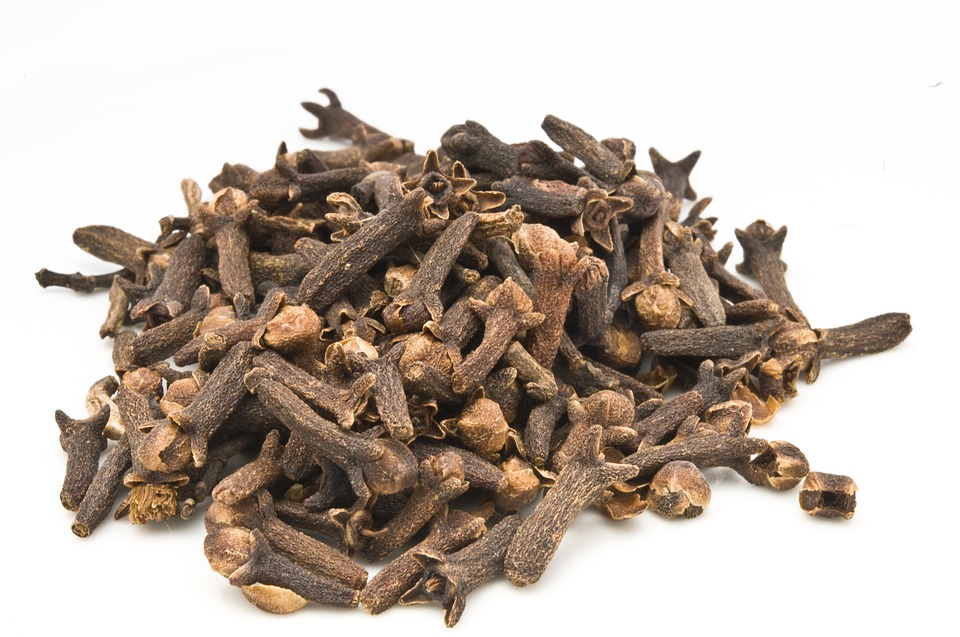

| Biological Name: Caryophyllus aromaticus, Syzygium aromaticum, Eugenia caryophyllataMyrtaceae |
| Other Names: Clove, clovos, caryophyllus |
| Parts Used: Flower buds |
| Active Compounds: Clove oil is 60 to 90 percent eugenol, which is the source of its anesthetic and antiseptic properties. |
| History:During the Han dynasty (207 B. C. to 220 A. D.) those who addressed the Chinese emperor were required to hold cloves in their mouths to mask bad breath. Traditional Chinese physicians have long used the herb to treat indigestion, diarrhea, hernia, and ringworm, as well as athlete’s foot and other fungal infections.
India’s traditional Ayurvedic healers have used clove since ancient times to treat respiratory and digestive ailments. Clove first arrived in Europe around the 4th century A.D. as a highly coveted luxury. The medieval German herbalists used cloves as part of anti-gout mixture. Once clove became easily available in Europe, it was prized as a treatment for indigestion, flatulence, nausea, vomiting, and diarrhea. It was also used to treat cough, infertility, warts, worms, wounds, and toothache. Early American Eclectic physicians used clove to treat digestive complaints and added it to bitter herb- medicine preparations to make them more palatable. They were also the first to extract clove oil from the herbal buds. They used it on the gums to relieve toothache. |
| Remedies For: Anodyne, antiemetic, antiseptic
Toothache, oral hygiene: Antiseptic Uses: Infection fighter: Digestive aid: Clove oil will stop the pain of a toothache when dropped into a cavity. A few drops of the oil in water will stop vomiting, and clove tea will relieve nausea. Eating cloves is said to be aphrodisiac. |
| Description: The clove is an evergreen tree, 15 to 30 feet tall, native to the Spice Islands and the Philippines but also grown in India, Sumatra, Jamaica, the West Indies, Brazil, and other tropical areas. It has opposite, ovate leaves more than 5 inches long; and its flowers, when allowed to develop, are red and white, bell-shaped, and grow in terminal clusters. The familiar clove used in the kitchen is the dried flower bud. The fruit is a one- or two-seeded berry. |
| Dosage: Infusion: Use 1 teaspoon of powdered herb per cup of boiling water. Steep 10 to 20 minutes. Drink up to 3 cups a day.
Medicinal amounts of clove should not be given to children under age 2. For older children and people over 65, start with low-strength preparations and increase strength if necessary. For temporary relief of toothache prior to professional care, dip a cotton swab in clove oil and apply it to the affected tooth and surrounding gum. |
| Safety: Toothaches require professional care. Clove oil may provide temporary relief, but see a dentist promptly.
Japanese researchers have discovered that like many spices, clove contains antioxidants. Antioxidants help prevent the cell damage that scientists believe eventually causes cancer. On the other hand, in laboratory tests, the chemical eugenol, has been found to be a weak tumor promoter, making clove one of many healing herbs with both pro- and anti-cancer effects. At this point, scientists aren’t sure which way the balance tilts. Until they are, anyone with a history of cancer should not use medicinal amounts of clove. For otherwise healthy non-pregnant, non-nursing adults, powdered clove is considered nontoxic. However, high doses of the oil may cause stomach upset when ingested. When used externally, it may develop a rash. Clove and clove oil in medicinal amounts should be consumed only under the supervision of a qualified professional. |
